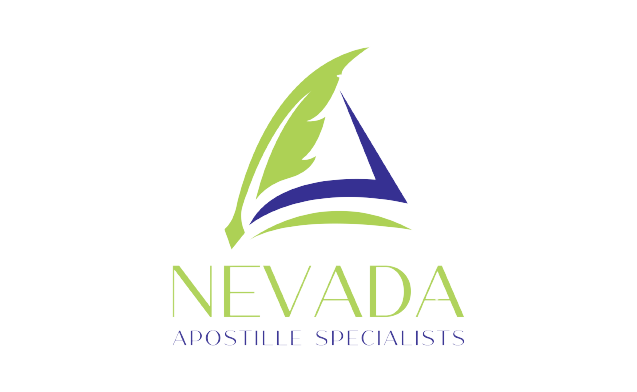Marriage License vs. Marriage Certificate: What’s the Difference?
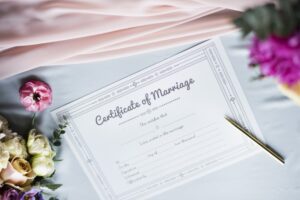
When planning a wedding, there are a lot of logistical and legal steps that come into play. Beyond choosing a venue, sending out invitations, and finding the perfect dress, there’s paperwork to handle that legally recognizes your marriage. Two key documents often come up in these preparations:
Marriage Certificates and Licenses. Although they sound similar, they serve distinct purposes in the process of getting married. Understanding the difference between these two documents is essential to avoid any legal complications and ensure your marriage is officially recognized. Here’s a breakdown of what each one is, why they matter, and how to obtain them.
What is a Marriage License?
A marriage license is a legal document you apply for before getting married. Think of it as permission from the government to marry – it grants you the legal right to wed. A marriage license is issued by a local government authority, usually at the county level, and requires specific documentation and sometimes a fee.
How to Obtain a Marriage License: Step-by-Step

- Research Requirements in Your Area: Each state (and even county) has its own requirements for obtaining a marriage license. Be sure to check these in advance to avoid any last-minute surprises.
- Visit the Local Clerk’s Office: Most marriage licenses are issued by the county clerk’s office or similar local authority. For instance, if you’re marrying in Las Vegas, Nevada, visit the relevant local office for Marriage Certificates and Licenses. Also, if you need a birth certificate Las Vegas Nevada, the same or related offices often provide these services.
- Bring Required Documents: Usually, both partners must present valid identification, like a driver’s license, passport, or birth certificate. If either of you was previously married, you may need to provide divorce papers or a dissolution of marriage certificate.
- Complete the Application: You’ll fill out an application form with essential information about yourself and your partner. This information generally includes full names, dates of birth, addresses, and sometimes parents’ names.
- Observe the Waiting Period: Some areas require a waiting period between obtaining the license and getting married, usually 1-3 days. This helps ensure that both parties have thoughtfully considered the commitment.
- Get Married Within the Validity Period: Most marriage licenses are valid for a set period, usually between 30 to 90 days. If you don’t get married within this timeframe, the license will expire, and you’ll need to reapply.
After the wedding, your officiant will sign the marriage license and return it to the issuing office, certifying that the marriage took place legally.
What is a Marriage Certificate?
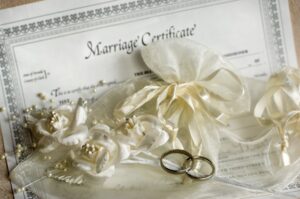
A marriage certificate, on the other hand, is the official document that proves you are married. It is issued after the marriage license is signed, submitted, and recorded by the local government. This certificate serves as legal proof of your marriage and is often required for various purposes, from changing your last name to applying for health insurance benefits or visas. If you are marrying in Nevada and need your marriage certificate recognized in other countries, you may require an apostille Nevada marriage certificate. An apostille authenticates the marriage certificate for international use.
How to Get Your Marriage Certificate
- Ensure the Marriage License is Submitted: Your officiant or witness will need to return the signed marriage license to the issuing office. This submission triggers the issuance of the marriage certificate.
- Request a Copy of the Marriage Certificate: Once the license is processed, you’ll typically need to request a certified copy of your marriage certificate, as it is not automatically sent in most places. You can usually do this in person, by mail, or online.
- Wait for Processing: Processing times vary, so check with your local office for an estimate. Some places offer expedited service for an additional fee, which may be helpful if you need the certificate right away.
Key Differences Between a Marriage License and Marriage Certificate
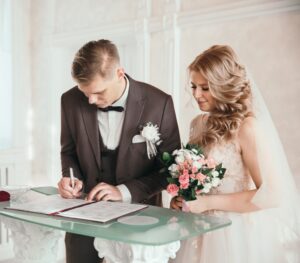
A marriage license and a marriage certificate serve distinct purposes in the marriage process. The marriage license is obtained before the ceremony, granting legal permission for the couple to marry, and is typically valid for a limited period, such as 30 to 90 days. After the ceremony, the officiant submits the signed license to the issuing office, which then issues a marriage certificate. This certificate is the official, permanent proof of marriage needed for legal and financial purposes, such as name changes, spousal benefits, and joint accounts. Simply put, the license allows the marriage, while the certificate confirms it officially.
Why You Need Both Documents
Having both a marriage license and marriage certificate is necessary for both legal and practical reasons. The marriage license gives you permission to marry, making your ceremony a legal event in the eyes of the government. The marriage certificate, on the other hand, is essential for life after the wedding, as it provides legal proof of your new marital status.
What Can Happen if You Skip the Marriage License?
Skipping the marriage license means your marriage won’t be legally recognized, even if you go through with the ceremony. Without this official permission, your marriage certificate won’t be valid, which could lead to significant issues, especially in legal and financial matters.
Common Questions About Marriage Licenses and Certificates
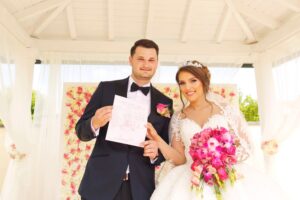
- Do I need both a marriage license and a marriage certificate?
Yes. You need a marriage license to legally perform your marriage ceremony. After the wedding, you will need a marriage certificate to provide proof of your marriage. - Can I apply for a marriage license online?
Some areas offer online marriage license applications, especially in larger cities. Check with your local government to see if this is an option in your area. - How long does it take to get a marriage certificate?
This varies by location, but processing can take anywhere from a few days to several weeks. It’s worth checking with your local office for specific timelines. - What if I lose my marriage certificate?
You can typically request a new copy from the same office that issued the original certificate. Additional fees may apply. - Is a marriage certificate required for a name change?
Yes, most jurisdictions require a marriage certificate to legally change your name on documents such as a driver’s license, social security card, and passport.
Practical Uses for Your Marriage Certificate
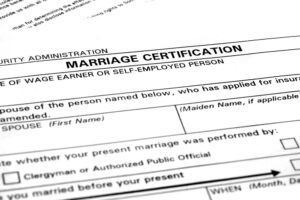
Once you have your marriage certificate, it becomes a valuable document for numerous personal and legal matters:
- Name Change: Many people use their marriage certificate to change their last name on official documents, including their driver’s license, passport, and bank accounts.
- Health and Insurance Benefits: A marriage certificate is often required to add your spouse to your health insurance, life insurance, and other benefits.
- Immigration and Visa Applications: For international couples, a marriage certificate can be necessary to secure spousal visas or immigration status.
- Joint Financial Accounts and Loans: Banks and lenders may require proof of marriage before adding a spouse to accounts or approving joint loans.
Final Thoughts

Understanding the distinction between Marriage Certificates and Licenses is essential to navigating the legal side of marriage. The marriage license is what allows you to marry legally, while the marriage certificate is the lasting document that confirms your union in the eyes of the law. Preparing in advance by researching local requirements and timelines can help streamline the process, allowing you to focus on the joyous celebration ahead. With these two documents, you can begin your married life with confidence, knowing that everything is legally in order.
Explore our full range of document authentication services by visiting us here .
Have Any Question?
Get In Touch:
getnotarized@apostillenevada.com
